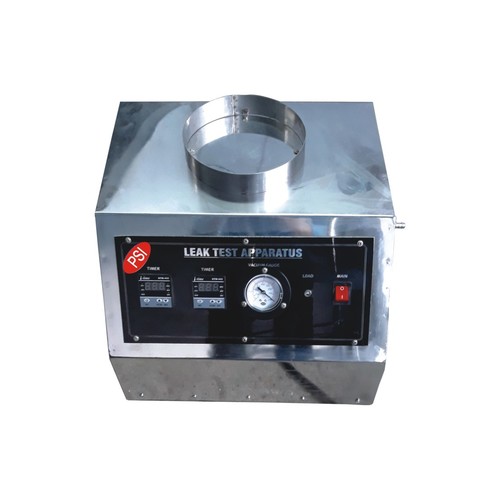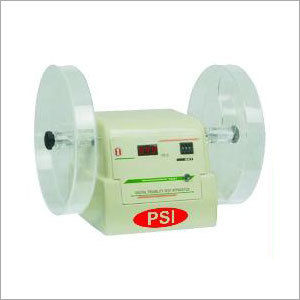Call Us
08045814219
Leak Test Apparatus
Product Details:
- Color Sliver
- Operate Method Automatic
- Material Stainless Steel
- Power Supply Electric
- Usage Industrial
- Click to view more
X
Leak Test Apparatus Price And Quantity
- 1 Piece
Leak Test Apparatus Product Specifications
- Industrial
- Sliver
- Automatic
- Stainless Steel
- Electric
Leak Test Apparatus Trade Information
- 1 Piece Per Day
- 1 Days
- Maharashtra Gujarat Madhya Pradesh Rajasthan
Product Description
Leak Test Apparatus availed by us is a high performance solid state instrument which is used in testing applications in various industries such as pharmaceutical, food, chemical and many more. It is manufactured by using advanced technologies and top grade materials. This equipment is installed with a number highly sensitive sensors and measuring devices which gives results in digital and analog forms. Buy from us this high quality product in bulk at a reasonable price.
Applications of Leak Test Apparatus:
1. Automotive Industry:
Engine Components: Ensuring the integrity of various engine components such as cylinder heads, valves, and fuel systems.
Fuel Tanks: Verifying the absence of leaks in fuel tanks to prevent fuel leakage and potential hazards.
Brake Systems: Checking for leaks in brake systems to ensure proper functioning and safety.
2. Medical Devices:
IV Bags and Containers: Verifying the integrity of seals and connections in intravenous bags and medical containers.
Respiratory Devices: Ensuring airtight seals in respiratory devices to maintain proper functionality.
3. Pharmaceutical Industry:
Drug Packaging: Verifying the seal integrity of pharmaceutical packaging to maintain product sterility and prevent contamination.
4. Electronics Manufacturing:
Electronic Components: Checking for leaks in electronic devices to prevent damage from environmental factors and ensure reliability.
Sealed Enclosures: Verifying the seals in electronic enclosures to protect sensitive components from dust, moisture, and other contaminants.
5. Aerospace Industry:
Pressure Vessels: Ensuring the integrity of pressure vessels in aircraft, spacecraft, or other aerospace applications.
Fuel Systems: Checking for leaks in fuel systems to ensure safety and prevent potential catastrophic failures.
6. HVAC Systems:
Refrigerant Lines: Verifying the integrity of refrigerant lines in air conditioning and refrigeration systems.
Ductwork: Checking for leaks in HVAC ductwork to ensure energy efficiency and maintain indoor air quality.
7. Plumbing and Pipeline Industry:
Pipe Joints: Verifying the integrity of joints in pipelines to prevent leaks and ensure the efficient transport of fluids.
Gas Lines: Checking for leaks in gas pipelines to prevent safety hazards.
8. Packaging Industry:
Food and Beverage Packaging: Ensuring the seal integrity of packaging for food and beverages to prevent contamination and spoilage.
Cosmetic Packaging: Verifying the seals of cosmetic product packaging to maintain product quality.
9. General Manufacturing:
Sealed Containers: Checking the integrity of seals in various containers to prevent leaks and maintain product quality.
Pressure Vessels: Verifying the integrity of pressure vessels used in various industrial processes.
Leak Test Apparatus FAQ:
Q. What is a leak testing apparatus?
Ans: A leak test apparatus is a device used to determine whether a component or system can maintain a specified level of vacuum or pressure without leakage. It is commonly employed in various industries to ensure the integrity and safety of products.
Q. Why is leak testing important?
Ans: Leak testing is crucial to identify and address potential leaks in components or systems, which can compromise safety, quality, and performance. It helps prevent issues such as product contamination, environmental hazards, and system failures.
Q. What types of leaks can be detected with a leak test apparatus?
Ans: Leak test apparatus can detect various types of leaks, including gas leaks, liquid leaks, and vacuum leaks. It is designed to identify any unintended or undesirable escape of substances from a sealed system.
Q. Which industries commonly use leak testing apparatus?
Ans: Leak test apparatus is used in a wide range of industries, including automotive, aerospace, medical devices, pharmaceuticals, electronics manufacturing, HVAC, plumbing, and general manufacturing.
Q. What are the common methods of leak testing?
Ans: Common leak testing methods include pressure decay testing, mass spectrometry, helium leak testing, bubble testing, and tracer gas testing. The choice of method depends on factors such as the type of product, sensitivity requirements, and the nature of the leaks being detected.
Q. How is a leak test performed using the apparatus?
Ans: The specific procedure may vary based on the method and apparatus used. Generally, the item under test is sealed, pressurized, or subjected to vacuum, and any change in pressure or the presence of a tracer gas is monitored to detect leaks.
Q. What are the advantages of using a leak test apparatus?
Ans: This device provides a non-destructive and efficient method of ensuring product integrity. It helps in identifying potential issues early in the manufacturing process, reducing the risk of defects and enhancing product quality.
Q. Can leak testing be automated?
Ans: Yes, many leak test apparatus systems are designed for automation. Automated systems can improve efficiency, repeatability, and accuracy in the testing process.
Q. Are there regulatory standards for leak testing in certain industries?
Ans: Yes, many industries have specific regulatory standards and requirements for leak testing. Compliance with these standards is essential for ensuring product safety and quality.
Q. What are the common challenges in leak testing?
Ans: Challenges in leak testing include the detection of very small leaks, variations in test conditions, and the need for fast and reliable testing in high-volume production environments. Addressing these challenges often requires careful selection of testing methods and equipment.
Tell us about your requirement

Price:
Quantity
Select Unit
- 50
- 100
- 200
- 250
- 500
- 1000+
Additional detail
Mobile number
Email
Other Products in 'COD Digestion Apparatus' category
We are dealing only in North India (West Bengal, Andhra Pradesh, Bihar, Chandigarh, Chhattisgarh, Dadra and Nagar Haveli, Daman and Diu, Goa, Gujarat, Haryana, Madhya Pradesh, Maharashtra, Uttar Pradesh, Rajasthan, Uttarakhand)
.






 Call Me Free
Call Me Free
